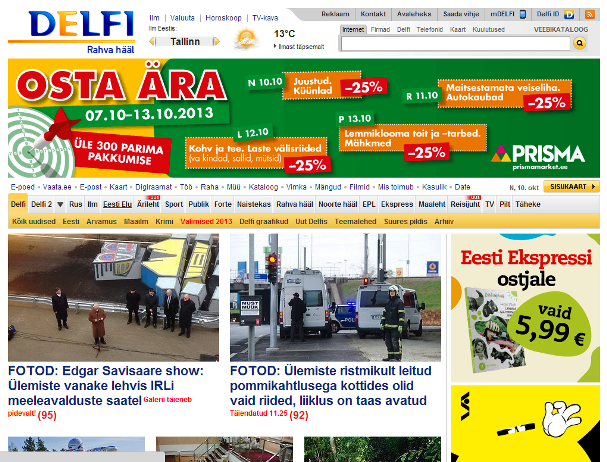Index relies entirely on the support of donors and readers to do its work.
Help us keep amplifying censored voices today.

An alarming judgment has been issued by the European Court of Human Rights that could seriously affect online comment threads.
The judgment in the case Delfi AS v Estonia suggests that online portals are fully responsible for comments posted under stories, in apparent contradiction of the principle that portals are “mere conduits” for comment and cannot be held liable.
Further, the unanimous ruling suggests that if a commercial site allows anonymous comments, it is both “practical” and “reasonable” to hold the site responsible for content of the comments.
The ruling concerns a case against Estonian site Delfi.ee. In 2006, Delfi ran a story about a ferry operator’s changing of routes. This story lead to some heated debate in the comments thread, with, according to the judgment “highly offensive or threatening posts about the ferry operator and its owner”.
The owner sued in Estonia, and in 2008, a court found Delfi responsible for defamation. Delfi appealed on the grounds the the European eCommerce Directive suggested it should be regarded as a “passive and neutral” host. The case eventually ended up in Strasbourg.
Today’s ruling contains several alarming lines for anyone who runs a website with comments. For example, the court suggests that:
Given the nature of the article, the company should have expected offensive posts, and exercised an extra degree of caution so as to avoid being held liable for damage to an individual’s reputation.”
This is curious: any moderator will tell you that controversial comments can appear in the unlikeliest of places.
The judgment goes on:
The article’s webpage did state that the authors of comments would be liable for their content, and that threatening or insulting comments were not allowed. The webpage also automatically deleted posts that contained a series of vulgar words, and users could tell administrators about offensive comments by clicking a single button, which would then lead to the posts being removed. However, the warnings failed to prevent a large number of insulting comments from being made, and they were not removed in good time by the automatic-word filtering or by the notice-and-take-down notification system.”
This seems to suggest that Delfi’s attempts to make to filter vulgar content and remind commenters of their liability have actually been used against them. Even the reporting system is not enough for the court.
Perhaps most worryingly, the judgment delivers another severe blow to online anonymity:
However, the identity of the authors would have been extremely difficult to establish, as readers were allowed to make comments without registering their names. Therefore many of the posts were anonymous. Making Delfi legally responsible for the comments was therefore practical; but it was also reasonable, because the news portal received commercial benefit from comments being made.”
It is difficult to see how any site would allow anonymous comments if this ruling stands as precedent.
This would appear to be truly troubling judgment for website operators and moderators.
The ruling is not yet final and may be subject to further review.
This article was originally posted on 10 Oct 2013 at indexoncensorship.org
In the age of social media, the European Union needs to defend free expression. But it often falls far short, says Padraig Reidy
While the Leveson Inquiry rumbled on today, rulings with huge consequences for the British press were handed down by the European Court of Human Rights.
Axel Springer v Germany and Hannover v Germany were both cases which tested the tension between the right to free speech and the right to privacy.
Von Hannover (in fact, this was Von Hannover v Germany no 2) was very important. The judgment concerned the definitions of public sphere, private life and public figure.
Since the 1990s, Caroline Von Hannover (daughter of the late King Ranier of Monaco and Grace Kelly) had sought to control publication of photographs of her in the German celebrity press.
To cut a long story very short, a 2004 judgment in Caroline Von Hannover v Germany 1 by the European Court found that photographs of the princess had indeed breached her article 8 right to privacy.
The judgment today concerned photographs of Caroline and her husband on a skiing holiday in Moritz, accompanied by an article on Prince Rainier’s health. Importantly, the court ruled that both that the prince’s health was an “event of contemporary society” and that Caroline and her husband were beyond doubt public figures.
The importance of the earlier Von Hannover rulings cannot be understated. In an interview with Index on Censorship last year, Mr Justice Eady, who deals with a large amount of privacy cases in the High Court, explained:
“As a rule courts must apply the test in the Princess Caroline case, von Hannover v Germany, decided by the human rights court in 2004: the decisive factor is whether the publication contributes to ‘a debate of general interest to society’.”
Mr Justice Eady and his colleagues will now have a different ruling to look to; one which places free expression ahead of privacy.

Former motorsport boss turned privacy campaigner Max Mosley has had his appeal to the Grand Chamber of the European Court of Human Rights rejected. Mosley had hoped to overturn a May ruling establishing that media outlets were not required to notify the subjects of stories in advance of publication. But the court today announced that that judgment would be final.
Solicitor Mark Stephens, who represented Index on Censorship, the Media Legal Defence Initiative and other interested parties in the case, said today: “This decision by the Grand Chamber and the previous decision by the court underline the recommendation made by the UK parliament’s Culture Media and Sport Committee. This is a great day for free speech in Britain and throughout Europe.”
Index on Censorship news editor Padraig Reidy commented: “Index submitted its concerns about Mr Mosley’s prior-notification plans as we recognised the threat such an obligation would pose to investigative journalism. While privacy is of course a concern, forcing newspapers to reveal stories would have a serious chilling effect.”